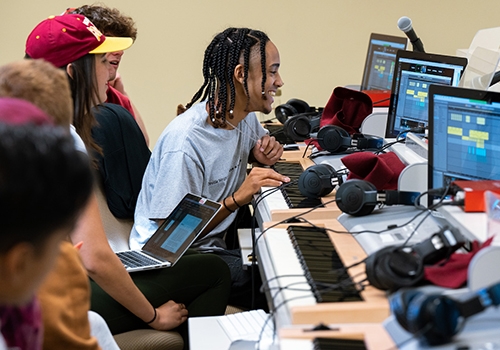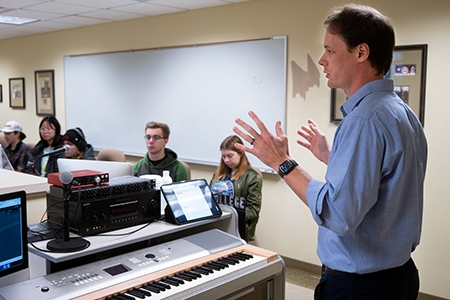The sounds of a digital musical composition filled the Music Technology Studio in the Taylor Music Center. As students absorbed the 90-second track, Chris Chandler encouraged them to listen carefully to what they heard.
He wanted them to identify the attributes or characteristics of the student-created piece.
“Think about sound, harmony, melody, rhythm and growth,” said Chandler, assistant professor of music. “How do those various elements change in different sections of the piece? You can see where layers are added or taken away. What are some qualities that define those different sections?”
An accomplished composer, Chandler introduced Music Technology 1: Transforming Sound, Making Music, to the Department of Music’s curriculum in 2019. That was followed by another course, Music Technology 2: Recording, Mixing and Synthesizing Sound.
Those two courses are integral to a new program at Union.
Building on the strengths of the College’s liberal arts and engineering programs, Union now offers a minor in music technology. Approved by a faculty vote last spring, the minor consists of six courses drawn from the departments of Music, Engineering, Computer Science and Visual Arts.
Open to students from all majors, the program will engage students with analog and digital technologies, and fundamental concepts through creative expression and scientific inquiry
“I have had several engineering students in my music tech classes, and it's been very rewarding to see their eyes light up when I talk about creative and artistic applications for concepts they have also encountered in their engineering courses,” said Chandler.
He will oversee the new program, which was developed in consultation with Jennifer Milioto Matsue and Tim Olsen from the Department of Music, and Shane Cotter, Luke Dosiek and Cherrice Traver from the Department of Electrical, Computer and Biomedical Engineering.
While music technology programs are not uncommon among larger colleges and universities, few liberal arts institutions, particularly those with engineering such as Union, offer the option.
“One of the things that attracted me to Union was the strong engineering program and the potential for interdisciplinary collaborations,” said Chandler. “There is a significant amount of shared content, particularly between Music Tech, Electrical Engineering and Computer Science. The minor is a perfect fit for a place like Union. It meets the needs of both music-interested students in engineering and technology-interested students in music.”
Students who choose to minor in music technology will be required to take three core courses. In addition to Music Technology 1 and Music Technology 2, this includes Introduction to Audio Electronics, which was developed by the Department of Electrical, Computer and Biomedical Engineering. Students will also select three electives from two categories, music and technology, which include courses from several departments on campus.
“The flexibility of this minor allows students to make the most of Union’s liberal arts core and find connections across different fields of study intersecting with music and technology,” said Chandler.
Chandler plans to develop additional courses that will count as electives. These include Introduction to Film Scoring, which will blend music technology and music theory with an emphasis on composing music for visual media, and Music Technology Workshop, centered on approaches to performing music with technology, such as synthesizers and hardware controllers. He also plans to develop Music Technology 3, a special topics course focused on modular synthesis and algorithmic approaches to digital music-making.
Enrollment in Chandler’s Music Technology 1 class this term is capped at 16 students. Majors represented include economics, computer science, psychology, political science, biology and biomedical engineering.
Abby Mitty ’23, an Interdepartmental major (ID) in psychology and Spanish from Boston, has been playing guitar and writing her own music for the past seven years. The music technology class has taught her how to use music production software.
“I mostly write acoustic music, but I have learned how to use digital instruments, which has allowed me to add a number of different features to my own music,” said Mitty. Upon graduation, she plans to go into organizational psychology while continuing to pursue her passion for music.
“I hope to take my music further and learn how to produce my own music,” said Mitty. “I haven't done anything with my music yet, but this class has inspired me to keep working on it and share it eventually.”
The introduction of a minor in music technology comes at a time when the Music Technology Studio is slated for a major renovation this winter. A gift from Kurt W. Hillig ’75 and his wife, Kathy J. Dien Hillig, will transform the layout of the space by upgrading the studio's equipment, including new computers, workstations, audio interfaces and microphones.
For more information on the music technology minor at Union, visit the website.


